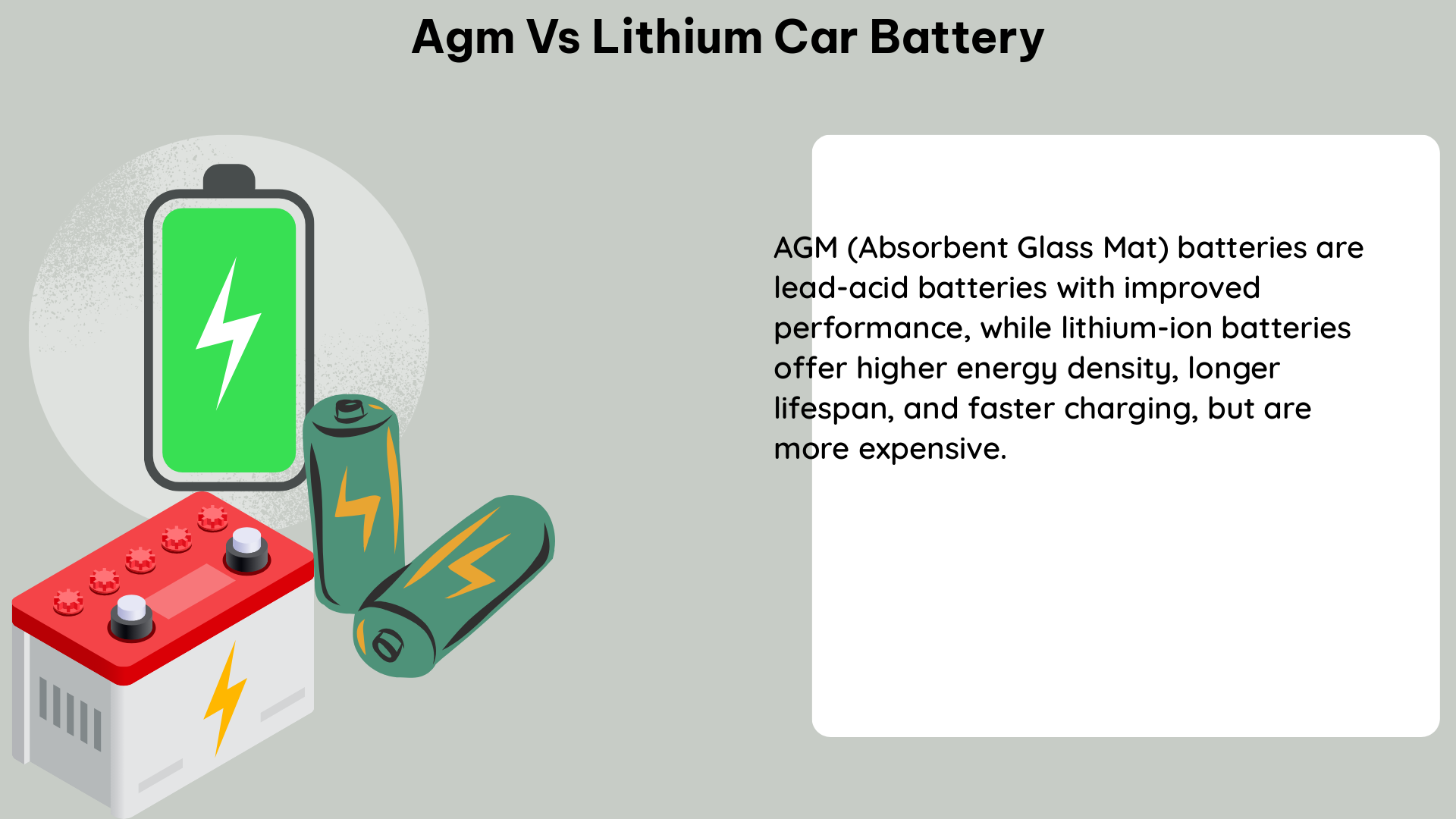When it comes to powering your vehicle, the choice between AGM (Absorbent Glass Mat) and Lithium-ion car batteries can have a significant impact on your driving experience, maintenance requirements, and overall cost of ownership. This comprehensive guide delves into the key differences between these two battery technologies, providing you with the information you need to make an informed decision.
Depth of Discharge (DoD)
One of the critical factors to consider is the depth of discharge (DoD) of the battery. Lithium-ion batteries have a remarkable depth of discharge of up to 98%, meaning you can utilize almost the entire charge capacity without damaging the battery. In contrast, AGM batteries have a depth of discharge of around 80% when new, which decreases to approximately 50% as the battery ages. This difference in DoD makes lithium-ion batteries more efficient and capable of providing more usable power.
| Battery Type | Depth of Discharge (New) | Depth of Discharge (Aged) |
|---|---|---|
| Lithium-ion | 98% | 98% |
| AGM | 80% | 50% |
Lifespan and Cycle Life

The lifespan and cycle life of a battery are crucial considerations, as they directly impact the long-term cost of ownership. Lithium-ion batteries, particularly those using LFP (Lithium Iron Phosphate) technology, have an exceptional lifespan, degrading by less than 1% per year and providing around 10,000 charge/discharge cycles. In contrast, AGM batteries typically degrade more quickly, offering a useful lifespan of approximately 500 charge/discharge cycles.
| Battery Type | Lifespan Degradation | Charge/Discharge Cycles |
|---|---|---|
| Lithium-ion (LFP) | < 1% per year | ~10,000 |
| AGM | Faster degradation | ~500 |
Size and Weight
Lithium-ion batteries have a significant advantage in terms of size and weight. Due to the absence of liquid acid, lithium-ion batteries weigh less than their AGM counterparts. Additionally, the higher depth of discharge of lithium-ion batteries means that a smaller battery can provide the same power as a larger lead-acid battery. AGM batteries, on the other hand, contain absorbed liquid acid, which adds to their overall weight. This weight difference can be particularly important in applications where weight is a critical factor, such as in electric vehicles or off-road vehicles.
| Battery Type | Weight | Size |
|---|---|---|
| Lithium-ion | Lighter | Smaller |
| AGM | Heavier | Larger |
Charging Time
Charging time is another crucial factor to consider when choosing between AGM and lithium-ion car batteries. Lithium-ion batteries charge significantly faster than AGM batteries, with some estimates suggesting they can charge over four times faster than traditional lead-acid batteries.
| Battery Type | Charging Time |
|---|---|
| Lithium-ion | Faster (> 4x lead-acid) |
| AGM | Slower |
Cost Considerations
While the initial cost of a lithium-ion battery may be higher than an AGM battery, the long-term cost of ownership can be more favorable. Lithium-ion batteries’ longer lifespan and greater capacity can offset the higher upfront cost, making them a more cost-effective solution in the long run. However, it’s essential to consider the specific needs and usage patterns of your vehicle to determine the most suitable and cost-effective battery option.
DIY Installation Considerations
When installing a lithium-ion battery in a car, it’s crucial to ensure that the battery management system (BMS) is compatible with the vehicle’s electrical system. The BMS is responsible for managing the charging and discharging of the lithium-ion battery, preventing overcharging and deep discharging, which can damage the battery. Additionally, it’s essential to securely mount the battery in the car to prevent it from moving around during driving, which can cause damage to the battery and the vehicle.
Conclusion
In conclusion, the choice between AGM and lithium-ion car batteries involves a careful consideration of various factors, including depth of discharge, lifespan, size, weight, charging time, and cost. Lithium-ion batteries offer superior performance in many of these areas, making them a compelling option for those seeking a more efficient and long-lasting power source for their vehicles. However, the specific needs and requirements of your vehicle, as well as your budget, should be taken into account when making the final decision.
References
- Forum Discussion on AGM vs. Lithium Batteries
- Reddit Discussion on Lithium vs. AGM Deep Cycle Batteries
- Comparison of AGM and Lithium Batteries

The lambdageeks.com Core SME Team is a group of experienced subject matter experts from diverse scientific and technical fields including Physics, Chemistry, Technology,Electronics & Electrical Engineering, Automotive, Mechanical Engineering. Our team collaborates to create high-quality, well-researched articles on a wide range of science and technology topics for the lambdageeks.com website.
All Our Senior SME are having more than 7 Years of experience in the respective fields . They are either Working Industry Professionals or assocaited With different Universities. Refer Our Authors Page to get to know About our Core SMEs.